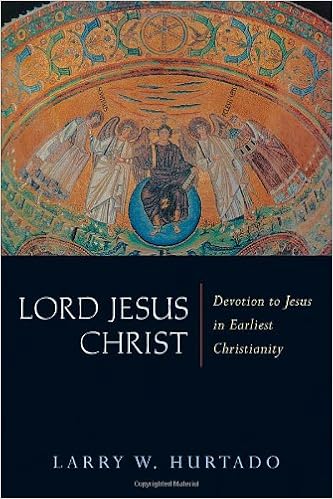THIS IS WHERE Hurtado's study gets up, close and personal, if we will let it. Why? Because: "Who did they pray to" is just a tiny step from "who do I pray to". Also, in ways surely never glimpsed by the disciples when they asked for assistance on how to pray to Jesus, the issue of how to pray seems complex when there are at least two, closely related potential recipients. So how does Paul handle it?
Paul's prayers seem to primarily aim for God, although as ever, Jesus is never far removed from view. In Romans 1, the prayer is even offered "through" Jesus. However, as Hurtado rightly notes, there are other occasions when both are addressed, such as 1 Thessalonians 3:11-13:
Now may our God and Father himself and our Lord Jesus clear the way for us to come to you. May the Lord make your love increase and overflow for each other and for everyone else, just as ours does for you. May he strengthen your hearts so that you will be blameless and holy in the presence of our God and Father when our Lord Jesus comes with all his holy ones.
There are also petition moments that include Jesus, such as Paul's famous petition to the Lord Jesus for the removal of his "thorn" in 2 Corinthians 12. Fascinatingly, Hurtado also informs us that in the "unsuccessful mutations" of Christianity, direct prayers to Jesus are actually more prominent than in the canonical material, which seems to keep something of a balance. Hurtado concludes:
Overall, we get the impression of a remarkably well-established pattern of prayer in which Jesus features very prominently, either as recipient or as unique agent through whom prayer is offered. Moreover, there is simply no analogy in Roman-era Jewish groups for the characteristic linking of Jesus with God in the prayer practice reflected in Paul's letters. (p. 140)
Notes
Paul's prayers seem to primarily aim for God, although as ever, Jesus is never far removed from view. In Romans 1, the prayer is even offered "through" Jesus. However, as Hurtado rightly notes, there are other occasions when both are addressed, such as 1 Thessalonians 3:11-13:
Now may our God and Father himself and our Lord Jesus clear the way for us to come to you. May the Lord make your love increase and overflow for each other and for everyone else, just as ours does for you. May he strengthen your hearts so that you will be blameless and holy in the presence of our God and Father when our Lord Jesus comes with all his holy ones.
There are also petition moments that include Jesus, such as Paul's famous petition to the Lord Jesus for the removal of his "thorn" in 2 Corinthians 12. Fascinatingly, Hurtado also informs us that in the "unsuccessful mutations" of Christianity, direct prayers to Jesus are actually more prominent than in the canonical material, which seems to keep something of a balance. Hurtado concludes:
Overall, we get the impression of a remarkably well-established pattern of prayer in which Jesus features very prominently, either as recipient or as unique agent through whom prayer is offered. Moreover, there is simply no analogy in Roman-era Jewish groups for the characteristic linking of Jesus with God in the prayer practice reflected in Paul's letters. (p. 140)
Notes
You may have noticed that I have been treating God as a uni-personal individual. This is in keeping with Hurtado and, I strongly believe, with Paul. We also are clearly thin on Holy Spirit in this area, certainly as a recipient of prayer. That obviously does not mean that Paul dos not have a great deal to say about the Holy Spirit, and indeed sees the Sprit as interceding/praying for us in Rom 8.


I think that the idea of understanding "God as a uni-personal individual" goes farther than Hurtado does. Could give a quote or two that verifies that? Getting some explicit quote from Paul that confirms this for him would also be challenging. OSISTM
ReplyDeleteBTW: while on the topic of prayer it should be noted that there is no biblical evidence that I know of for prayer being directed to the Holy Spirit--you didn't mention that. Why?
Great points Richard. I will add the one about the Holy Spirit. Thanks
Delete